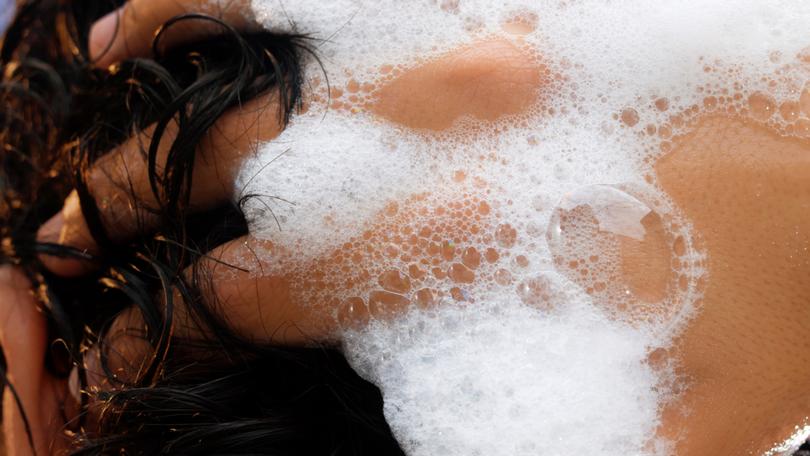The New York Times (Science Times): Is it bad to wash your hair every day?
Have you ever wondered if you are washing your hair too much? Or too little? You’re not alone.

Q: I’ve heard that washing your hair every day can strip it of its natural oils, making it dry and brittle and causing scalp irritation. Is that true? And what if I exercise regularly?
A: Whether you should lather up daily depends on a number of factors, said Dr. Murad Alam, vice chair of the department of dermatology at the Northwestern University Feinberg School of Medicine. Among them, he said, are your hair’s texture, how oily it gets, how processed it is, your lifestyle habits and your age.
Shampoo cleanses your scalp and hair by removing environmental contaminants like dirt and pollen, as well as dandruff, sweat and hair-care products.
Sign up to The Nightly's newsletters.
Get the first look at the digital newspaper, curated daily stories and breaking headlines delivered to your inbox.
By continuing you agree to our Terms and Privacy Policy.It also dissolves sebum, an oily, waxy substance produced by the sebaceous glands near your hair follicles. Sebum keeps your scalp from becoming too dry, said Dr. Rosemarie Ingleton, an assistant clinical professor of dermatology at Mount Sinai Hospital in New York City, and protects the skin from infection.
But if sebum builds up, she said, it can cause problems.
When to wash daily
Using shampoo every day, Alam said, can be the right choice for people with oilier scalps where sebum can accumulate, making the hair limp, greasy and possibly smelly.
Those with fine hair, Alam said, may also find that it becomes greasy more quickly, because there is less hair to absorb the oil. For them, a daily lather may be warranted.
Daily washing may also be needed, Alam added, if you frequently use products such as gels or hair sprays, which can build up on your scalp and cause irritation — or even hinder hair growth by clogging the hair follicles.
When to avoid daily shampooing
Not all hair textures can tolerate a daily wash, Ingleton said, including curly or coily hair, which may dry out, become brittle or break if washed daily or even every couple of days. If you’re Black, the American Academy of Dermatology recommends washing your hair every week or every other week.
Dr. Shereene Idriss, a dermatologist and founder of Idriss Dermatology in New York City, has stricter recommendations for washing, regardless of how fine or oily hair is.
“When it comes to your scalp health, I do not regularly recommend washing your hair every day,” Idriss said, adding that it could lead “to irritation, inflammation and other scalp problems.”
Chemical treatments such as hair dyes and relaxers can make the hair shaft more prone to damage, Alam said. He recommended washing chemically treated hair two to three times a week.
Certain medications like statins, antihistamines and diuretics may also increase skin and scalp dryness, Alam said. If you take them, he added, wash your hair with a gentle shampoo that contains moisturizers to prevent dryness and irritation.
It can also be helpful to use shampoo with warm instead of hot water, since lathering with hot water can remove too much oil from the scalp, Alam said.
“While it may seem that getting the scalp squeaky clean and without any oils is optimal, keep in mind that the scalp is a living part of your body and not a dinner plate in your dishwasher,” Alam said.
Age can also dictate your shampooing schedule, Alam said. Sebum production is typically slow during early childhood, goes into overdrive during puberty, levels out during adulthood and slows down gradually after age 70. So if you are older, your scalp might be drier, and it may not require a daily scrub.
What to do if you exercise regularly
If you habitually work out and you’re an excessive sweater, Alam said, the salt from sweat can clog your pores and hair follicles. That may require a daily wash or rinse “to clean out the salt and secretions,” he said. “If you do not at least rinse your hair afterward, you can get inflammation of your hair follicles, which is called folliculitis, and pimples on your scalp.”
This becomes even more important if you have oily hair, Idriss said. You may need to wash it every day, she added, but you don’t always need to use shampoo.
“Alternating a shampoo wash with a water rinse every other day can help minimize stripping your scalp of oil,” Idriss said. And drenching your hair with plain water, she added, “can be enough to get you to the next day.”

If you just can’t skip the shampoo, Idriss said, opt for a mild formula that has “sulfate-free” or “gentle” claims on the label, and avoid hot water and excessive scrubbing, both of which can irritate the scalp.
As for drying, Alam recommended air drying whenever possible, “which is the least traumatic for your hair.”
If you wash your hair every day and your scalp is not irritated, your hair isn’t dry or brittle, and you are not losing any hair, Alam said, “then keep doing what you are doing.”
This article originally appeared in The New York Times.
© 2024 The New York Times Company
Originally published on The New York Times
